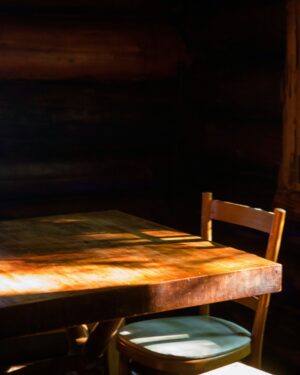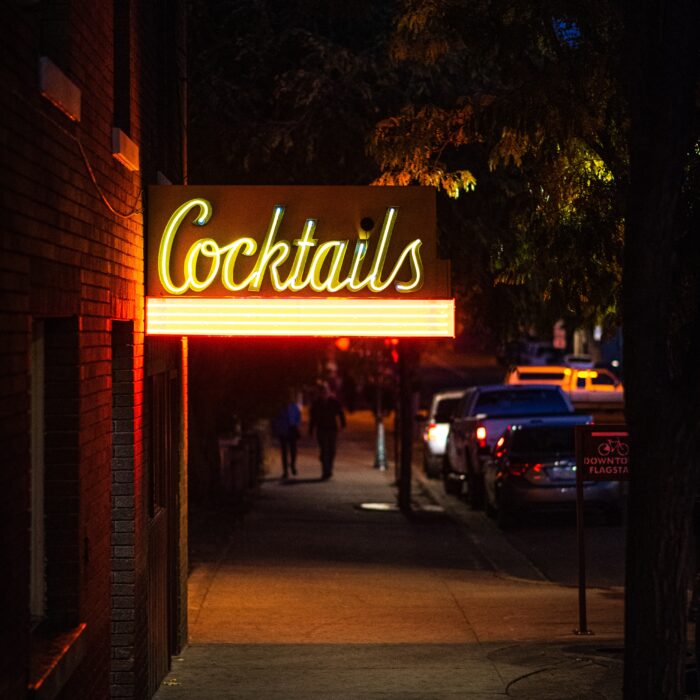You have no items in your cart. Want to get some nice things?
Go shopping
As a writer, I learned early on there was no one place to call home.
Creativity bubbled inside my veins and pushed out in a need to express endless words; words that needed to be captured on paper; words to make sense of my emotions; words to help envision how I viewed the world and fit in. These words drove me to search for a place to write.
At twelve years old, my place was the end of my family’s dining room table. I sat at a rich mahogany table covered in cheap plastic. My mother had learned this trick from my Italian grandmother, who swore it was the only way to protect the integrity of the wood. My grandmother did this with all of her furniture. I still remember my thighs sticking to the thick material, crinkling noisily each time I shifted position.
My chair was part of the matching set, with a curved, spindled back and a paisley cushion on the seat. The window was behind me. A centerpiece of dried flowers sat in front, scenting the air with eucalyptus. The floors were old and creaky; voices echoed endlessly from the attached kitchen, so I wore headphones and blasted an endless stream of music to protect my precious bubble of story. I wrote longhand, with a black Bic pen, in a spiral notebook, then graduated to a Brother typewriter. I wrote two books there.
In my mid-teens, I moved to my room and created a corner office space. This time, I faced the window. I watched cars pull in and out of our driveway while my father sat in a metal folding chair, chain smoking cigarettes as he contemplated the small grassy lawn that was his domain. My desk was pine and wobbled when I pounded the keys too hard. The walls were pale yellow with random, splattered bug stains. I’d taped my first official rejection letter to the wall I faced daily, so when I looked up from my work, I’d be reminded that my story had been rejected. It was my proof that I was a real writer. I read it every day and tried harder. I wrote three books at that desk.
Home morphed into apartments shared with girlfriends; a fancy condo with a temporary fiancée, and finally with my husband in our first house—a small brick ranch. I converted the spare room into an office and spent seven years at my new desk—this one a giant Walmart special in blanched beige fake wood. I faced yet another wall—this one painted a bright, creative orange. The one window to my left leaked air. I was cold in the winters and hot in the summer. I bought a real chair that was well cushioned with back support and spun around when I got bored.
I spent hours in that room, first working on my Master’s degree in English literature, then writing short stories and mommy blogs in my quest to connect with readers and get published. I sensed home was a place I could write, and it was a moving target—from a busy coffee shop, a picnic table in the sun during my given lunch hour, or trapped in a laundry room while my toddler boys screamed and played behind me.
But what I remember the most about that house was more than my work. Within those five rooms I spent my days with my husband, our two rescue dogs and two toddlers. There was nowhere else to go; nowhere to escape. So, we leaned in to the chaos of working full time jobs and changing endless diapers and hearing Barney and SpongeBob and Mickey Mouse on repeat and confronting the stress of bills with a totality of vision and commitment that made all the difference. We were immersed in our world—the good, the bad, and the ugly.
One afternoon, I attended a children’s birthday party. The house was an elegant black and white colonial with gently sloping hills and the mother was dressed in a bright yellow maxi dress that flowed over her willowy body. She exuded an effortless grace even with her three small kids, who were also perfectly dressed, while I could barely seem to get my teeth and hair brushed in the morning. Envy nipped, but the wise voice inside reminded me if I wanted that life, I’d have to take it all—including the hidden parts inside the glamour I knew nothing about; those fragments that no one talks about on social media or smart cocktail lunches, and I realized I wouldn’t trade for anything. I owned my broken parts. It was mine—in all its imperfections—and I left that afternoon with a lightness that told me I was learning how to navigate place in a different way. From the heart, rather than the head.
After years of writing and rejection, my work was published. The book that garnered endless no’s suddenly rocketed to stardom and went viral. People read it on trains and subways, bookstores stocked it on shelves, and Target dedicated a display to shoppers. It hit the USA Today list. Then it sat on the New York Times bestseller list for twenty-six weeks.
Life changed.
We built the house of our dreams. Tucked on a dead-end road, surrounded by acres of woods behind and to the side for dedicated privacy, my kids had neighborhood friends to ride bikes and gather at the bus stop with. The mighty Shawangunk mountains shimmered in the distance. Thickets of trees offered shade and breath. The outdoor deck seduced me into long hours with my Mac, the chatter of birds new music to my ears, the blue water from the inground pool shimmering in the sunlight. My office boasted double windows that looked onto acres of sloping green grass and colorful flowers bursting in bloom. My desk was a deep onyx, gleaming with high polish, the massive surface holding a giant screen, printer with scanner, endless knick-knacks, and fancy planners. Wall sized bookshelves were behind me, crammed with my foreign translations, paperbacks, and audios. A framed New York Times Bestseller list to my right reminded me of success. Place was suddenly one of my dreams from years ago, from that girl who wrote at her dining room table. Place was suddenly a new type of prison with a pressure to create bigger and better. Writing became a job. My office was both a haven and hell. I struggled to assimilate amidst the sudden privacy, with my closed door and professional shelves and gorgeous view. I had arrived.
The boys grew. My dogs passed and we adopted two new rescues. I wrote endless books. Then, one day, my father called. He was in bed, writhing in pain. He’d beaten cancer five years ago, so when we found out it was kidney stones, it was pure relief. Looking back, I knew the truth. So did he. We just didn’t want to face it.
Further tests showed the cancer had returned, but this time, there would be no fighting back. The poison had sunk into his bones and lungs and burrowed too deep. My brother and I took him home and brought in Hospice.
For ten days, my place was in his room, sitting next to a hospital bed. We talked about movies and books and the New York Mets. We hosted visitors and laughed about old times. We watched Game of Thrones into the night. I learned how to change his sheets and take him to the bathroom.
His body broke down by the hour. My world flipped when I became the caretaker, and needed to change his diaper; to feed him each mouthful of food; to guide the water to his lips as he took his numerous pain pills.
Place became those four walls next to my dying father. It became the memories and the honor of watching him slip away, while I held the space beside him. To be surrounded by family who came together and grieved and loved and felt the collateral beauty of a life passing on.
When I returned from the funeral, I went back to work. I had a deadline. My office was the only place I could be in, but the words had dried up and got stuck somewhere the Muse couldn’t reach. Days passed, in front of my computer, facing a white screen that used to scream of possibilities but now only reflected despair. I had nothing to give.
I pushed out my deadlines and sunk into my grief. For three months, home was the cocoa brown recliner chair in the living room under an oversized Christmas blanket. Grief became a physical ache in my body that I had to honor, accept, and allow to change me. It took time. It took all the strength I had to let go of deadlines and expectations and plans. I came out the other side a different person. Eventually, I got back to work, finding my footing tentatively in story, lacking in confidence, more of a student than professional. Writing became an act of faith—if I showed up, eventually the story would be found. I gritted my teeth and showed up. I kept my part of the bargain.
Place slowly began to expand. I found home not only in my office, but my trips to author signings around the world. I met and signed books for readers and mingled with authors on whirlwind trips squeezed into long weekends. We shared secrets of how to launch successful Facebook ads, score a saleable cover, and break down the mysterious algorithms of Amazon. I drank champagne while gazing at the blazing lights of the Eiffel tower; visited the drizzly highlands of Scotland where Braveheart was filmed, and feasted on poutine—salty fries smothered in gravy—in Montreal. I rode a mechanical bull in Austin, drank Moscow Mules on a rooftop in Nashville, and went ziplining in Colorado between workshops and reader signings.
The world was my place. Until it was not.
Covid created a hard pivot. Suddenly, travel was shut down, and my sacred home space was shared with two teen boys and my husband. Suddenly, there were no other places to go, including school, and I found myself turning inward, going deep, and finding peace within, surrounded by family. My house was my world now. I created in a bubble of safety, removed from the everyday demands of grocery shopping, school trips, orthodontist appointments, and track meets. I embraced the isolation. I sunk deep into my story, began exercising, and played board games with my kids every night. Place was once again my four walls, tucked safely inside, while the world burned down around us. I found solace in the quiet and sought out a daily mediation practice. I began to match the outward quiet with my inside, finding some of the breath and space and reconnection I’d given away.
Slowly, the world opened back up, and I struggled for balance. I began to resent being places other than my home. I felt awkward seeing people and making conversation. I’d lost my ability to be fake or skim the surface of polite society. I became a mess of emotions as I was forced to leave my cocoon and go back to what was supposed to be normal. I wandered about my new life, feeling less soulful, but not knowing how to gain back the peace I’d won during lockdown. I was forever changed. My place became rocky and uneven. I desperately sought new footing. How do I balance the endless demands against the craving for solitude? How do I interact with others in my new skin? How do I learn to say no?
I compromised. I found a place in both worlds, but I was less sure now, especially in my writing. I craved to write something new and break out of my successful branding that had become a prison. And as much as I loved the place I’d grown up in, my soul became restless. I dreamed of the beach. My vision turned from majestic mountains, icy winters, and farmland to ocean waves and sand. After the long COVID lockdown, I felt ready to turn my next dream into a reality, and invest in a small beach house in my favorite place.
Cape May, New Jersey. Hop on the Garden State Parkway and pass all the Jersey shore points. When the highway ends at Exit 0, this beach town gem shines, offering brightly colored Victorian inns and gorgeous beaches. We found a small cottage in robin egg blue a few blocks from the bay. The salt water healed us all, and I wrote new stories in my second home, spending precious sunsets on a blanket, raising my wine glass to the dying light of another day.
As the years pass, I realize home is more than a place. From family, to writing, to my children… Chasing nature, chasing fortune, chasing endless summers, chasing dreams, all of it becomes a glorious, spinning, colorful whirl in my mind, but settles quietly, softly, like the gentle rush of breath as it leaves the lungs.
Home is a place, but I now carry it inside. It is mobile and fluid. It is joy and pain. Place is a great gift that will keep teaching me lessons and bestow shocking beauty, but most of all, place gives the most precious thing of all.
Stories. All places contain a story, as unique as each of us.
I have more paths to explore. More books to write. More places to discover.
Until I return back home.
About Jennifer Probst
Jennifer Probst is a NYT, USA Today, and Wall Street Journal bestselling author of over 50 books in contemporary romance fiction. She loves hearing from readers.




